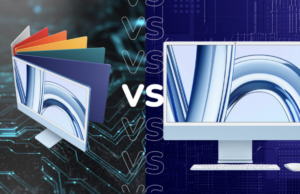Looking to build the most powerful consumer desktop possible? Then you’ll likely be deciding between two processors: the Intel Core i9-14900K and the AMD Ryzen 9 7950X3D.
But which is the best CPU, and how do they differ? We’ve tested both processors, and so are well placed to answer that question. We’ve not only made sure to test performance with a variety of benchmarks, but have also factored in other elements such as price, power efficiency and more.
So if you’re struggling to decide between the Intel Core i9-14900K and the AMD Ryzen 9 7950X3D, keep reading this comparison guide for the full breakdown.
Price and availability
The Intel Core i9-14900K launched back on 17th October 2023, making it the latest desktop processor from team blue. It has an MSRP of $589, although can be found for cheaper on third-party retailers.
As for the AMD Ryzen 9 7950X3D, it launched even earlier that year on 28th February 2023, with a launch price of $699. That made it an extremely expensive processor on release, but the cost has since dropped to be roughly the same as the Intel Core i9-14900K.
Specs
The Intel Core i9-14900K is based on the Raptor Lake architecture, and so is based on the Intel 7 process, with a 10-nanometer process. Meanwhile, the AMD Ryzen 9 7950X3D chip is based on Zen 4 architecture with a 5nm node. A smaller node will generally translate to a greater performance, but that’s not always the case.
The Intel Core i9-14900K has a whopping 24-core count, made up of 16 efficient-cores and 8 performance-cores. The Intel chip also has 32 threads. Back over to AMD, and the Ryzen 9 7950X3D has 16 cores (all made equally) and 32 threads. Since Intel is using a hybrid model of cores, it would be unfair to suggest a higher core count equates to a faster performance.
One area that’s a little more simple to judge is peak clock speed, which gives you a good idea of the expected single-core performance that’s important for workloads such as gaming. The Intel Core i9-14900K is capable of a boosted clock speed of 6GHz, whereas the AMD Ryzen 9 7950X3D can only hit 5.7GHz without an overclock.
However, the AMD Ryzen 9 7950X3D has a special trick up its sleeve in the form of the 3D V-cache technology. Without getting too technical, 3D V-cache allows the processor to make use of additional L3 cache to improve performance, especially for gaming where supported. The big caveat here is that not every game will benefit from this performance boost, so it’s very dependent on what you’re playing.
Performance
We tested both the Intel Core i9-14900K and AMD Ryzen 9 7950X3D on the same test rig, and so have a good understanding of how these processors differ in terms of performance.
The Intel Core i9-14900K consistently posted superior single-core and multi-core benchmark results across all of our tests, proving it to be the better performer for both gaming and content creation workloads. The only area where the AMD Ryzen 9 7950X3D stole a lead was in the integrated graphics. That’s useful if you’re playing low-intensive games without a graphics card, but I imagine that won’t be the case for the vast majority of people.
We also made sure to test the two chips with in-game benchmarks to get a better idea of real-world gaming performance. The Intel Core i9-14900K once again dominated, with a 9fps advantage for Horizon Zero Dawn (1080p), 29fps boost for Borderlands 3 (1080p) and 6fps increase for Returnal (1080p).
It is possible for the AMD Ryzen 9 7950X3D to steal a lead in gaming performance for select games thanks to the 3D V-cache technology, but it’s difficult to determine which games will actually benefit – none of those in our group test seemingly did.
Power consumption and temperature
Intel may be the clear winner when it comes to performance, but all of that power comes at a cost: specially, via your energy bill.
The Intel Core i9-14900K is a power-hungry beast, drawing an extra 29% of power compared to the AMD Ryzen 9 7950X3D when under stress. This also means you’ll need to be mindful that your PSU has a large enough capacity.
It’s a similar story when it comes to the processor’s peak temperature, with the Intel Core i9-14900K running 9 degrees hotter in our stress test than its AMD rival. This means you’ll need a high-powered cooling system in order to maximise performance and longevity.
The AMD’s chip’s impressive thermal performance and power efficiency are food for thought. It may not be as powerful as its Intel nemesis, but it’s certainly more efficient.
Verdict
If you’re looking for the absolute fastest consumer desktop processor – either for gaming, content creation or any other workload – then our tests show that the Intel Core i9-14900K is the one to go for.
The AMD Ryzen 9 7950X3D did prove to be more power efficient though, while also seeing a cooler peak temperature under stress. And the clever 3D V-cache shouldn’t be underestimated, even if it sadly doesn’t result in a performance boost for every single game.
But considering both chips are available for roughly the same price, it’s difficult to look past the Intel Core i9-14900K as the best CPU option.










